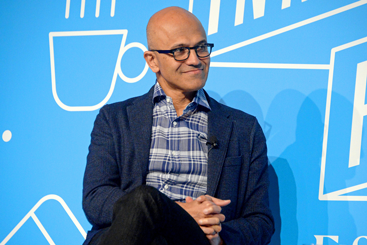
Tuesday, June 29, 2021
Can Microsoft's share price go higher after joining the $2trn club?
By Century Financial in 'Brainy Bull'


Microsoft's [MSFT] share price has been on a winning streak this year, resulting in the tech giant becoming the second US company to hit a $2trn market cap, joining Apple in this exclusive club.
How did it hit this milestone? Since taking the helm in 2014, Chief Executive Officer Satya Nadella has guided Microsoft to become one of the dominant players in the cloud computing and enterprise software market through products like Azure and Microsoft 365.
In that time, Microsoft’s share price has surged circa 600% (as of 25 June’s close), and analysts reckon there could be more gains ahead thanks to a product line up that has benefitted from the digital acceleration caused by the COVID-19 pandemic.
"We have seen two years' worth of digital transformation in two months. From remote teamwork and to sales and customer service to critical cloud infrastructure and security, we are working alongside customers every day to help them stay open for business in a world of remote everything," said Nadella after Microsoft’s last earnings call.


What’s happening with Microsoft’s share price?
Microsoft’s share price has gained 19.2% since the start of the year. While the stock tumbled in spring’s tech selloff, since the 12 May the stock has gained 7.6% (as of Friday’s close), steadily trending upwards, outpacing both Amazon [AMZN] and Apple [AAPL]. Going in Microsoft’s favour has been a lack of attention from regulators, with antitrust investigations giving investors in Amazon and Apple the jitters.
While Microsoft closed Friday with a market cap a shade below the $2trn, Wall Street still expects further upside in Microsoft’s share price. On Yahoo Finance, the stock carries an average $297.56 analyst price target - hitting this would see a Y% upside on Friday’s close.
How is cloud computing adding to Microsoft’s share price?
Microsoft was a big stay at home play in 2020. Not only did office workers get reacquainted with their Xboxes, use Microsoft Teams and Office 365 to get work done, but their employers also shifted legacy systems to cloud computing platforms like Azure.
The Intelligent Cloud segment, containing Azure, saw its revenue come in at $15.1bn in the three months up to 31 March, topping the $12.3bn seen in the same period the previous year. Server products and cloud services revenue increased 26% year-on-year, driven by Azure revenue growth of 50%.
Microsoft’s productivity and business processes segment, which includes Office365, had revenue of $13.6bn, up from $11.7bn. Office Commercial products and cloud services revenue jumped 14%, boosted by Office 265 Commercial revenue growing 22%.
Microsoft enjoys an incumbent position, with many companies and organisations already using its software. Azure also benefits from its ability to work with other cloud services, helping enterprises that want to connect to multiple cloud services through one provider.


“The Microsoft Cloud, with its end-to-end solutions, continues to provide compelling value to our customers generating $17.7 billion in commercial cloud revenue, up 33% year over year," said Amy Hood, executive vice president and chief financial officer of Microsoft.
The markets have taken notice. Since the start of April 2020, when most of the world was going into its first lockdown, Microsoft’s share price has performed even better, up around 72% as of Friday’s close, topping Amazon’s 19% gain over the same period.
Where next?
Last week, Microsoft announced the launch of Windows 11. In 2006, Microsoft’s Windows operating systems accounted for 97% of the market, according to ZDNet. In 2020, Microsoft’s market share stood at 80.5% as Google and Apple’s operating systems chip away at Windows' dominant position.


Simply put, Microsoft will no longer live or die based on the strength of Windows alone. According to Bloomberg, the Intelligent Cloud segment represented 33.8% of Microsoft’s 2020 revenue, making it the Washington-based company’s largest business segment. So even if Windows 11 is a dud, Microsoft will still likely continue to perform strongly because of the sheer depth of its product offering.
“Microsoft checks all the boxes: it is in the markets that investors favor, it offers strong and sustainable growth, and it remains very well positioned to capitalize on the long-term secular trends we see in technology,” said Logan Purk, an analyst at Edward Jones. The analyst noted that the $2trn market cap “is warranted, given how it has pivoted toward the cloud, and it remains attractively valued even given the strong performance.
Source: This content has been produced by Opto trading intelligence for Century Financial and was originally published on cmcmarkets.com/en-gb/opto
Disclaimer: Past performance is not a reliable indicator of future results.
The material (whether or not it states any opinions) is for general information purposes only and does not take into account your personal circumstances or objectives. Nothing in this material is (or should be considered to be) financial, investment or other advice on which reliance should be placed. No opinion given in the material constitutes a recommendation by Century Financial or the author that any particular investment, security, transaction or investment strategy is suitable for any specific person.
Century Financial does not endorse or offer opinion on the trading strategies used by the author. Their trading strategies do not guarantee any return and Century Financial shall not be held responsible for any loss that you may incur, either directly or indirectly, arising from any investment based on any information contained herein.















